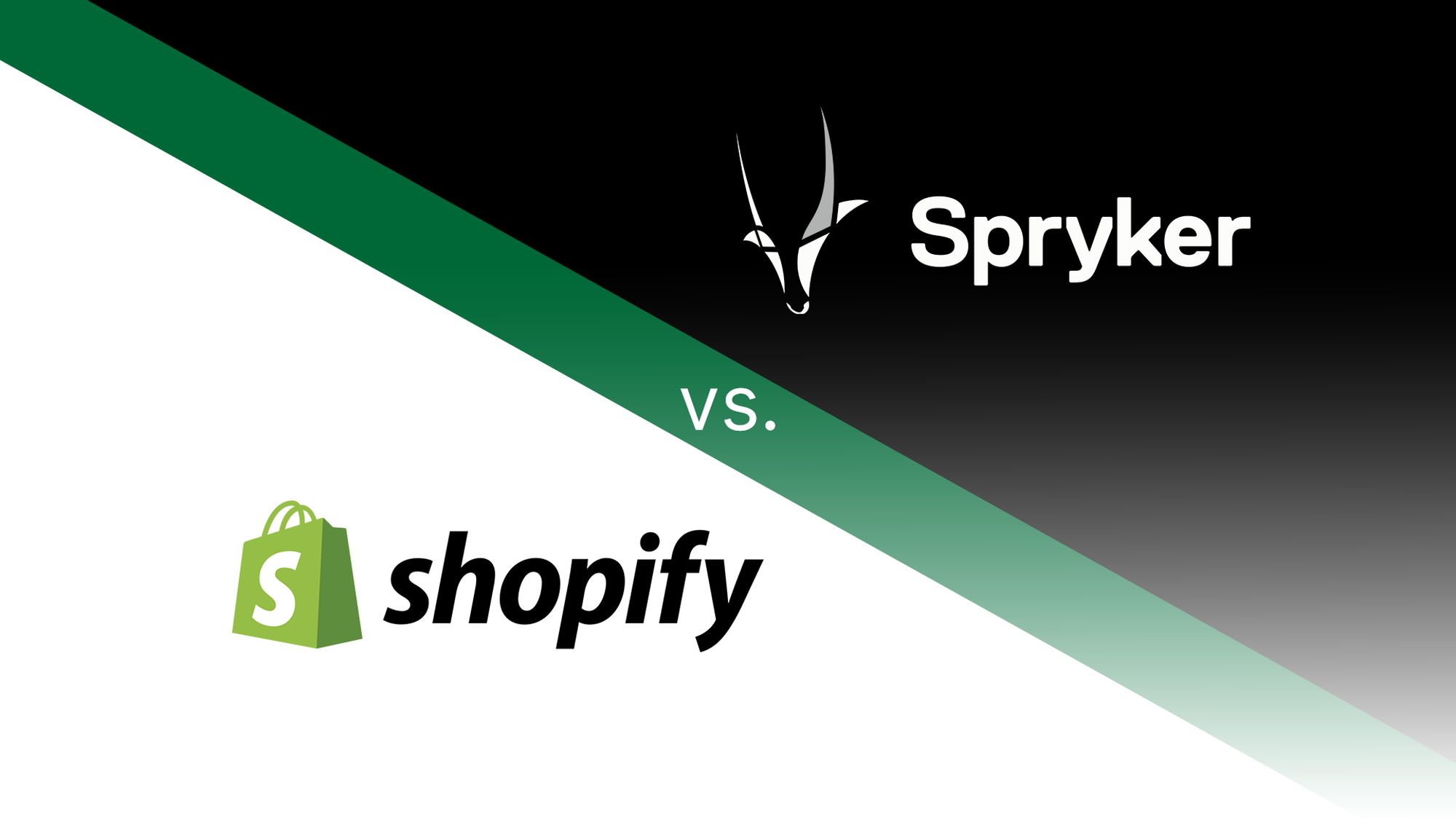In today's digital world, building a successful e-commerce presence is crucial for businesses to keep up with the increasing demand for online shopping. However, if you're looking to switch your store system, you have a variety of options to weigh.
Between the myriad of Spryker alternatives, it can be difficult to keep track. Shopify is a popular option in many cases when considering a store migration, as the platform offers advantages over Spryker, particularly in terms of user-friendliness and complexity.
In this article, we'll show you which Spryker alternatives are available to you and take a close look at a comparison between Spryker vs Shopify. This will help you determine whether Shopify is the right solution for your business and what the benefits of migrating are.
Table of contents
Do you need support with the migration of your store? As Shopify Plus experts, we will be happy to assist you and help you customize your store to meet your requirements. Get in touch with us.
What is Spryker?

Spryker is an e-commerce solution based in Berlin that was founded in 2014 and aims to replace conventional systems with innovative technologies. It offers companies the opportunity to provide relevant information via various communication channels and specializes primarily in B2B companies and marketplaces. The cloud-based platform works with a headless approach, which offers users a high degree of flexibility. With the help of modules and a variety of APIs, companies can adapt the platform to their needs. The functions offered include product search and filtering, order and inventory management as well as various merchandising and marketing tools.
However, it should be noted that the use of Spryker requires a certain amount of technical expertise and financial resources due to its complexity and the associated costs.
Why are merchants switching from Spryker to Shopify Plus?
Spryker merchants face a number of challenges when using the platform. One of the biggest challenges is the complexity of implementation and customization. Because Spryker is a highly flexible and customizable e-commerce solution, implementation often requires experienced developers and a deep understanding of the platform. In addition, integration with other systems such as ERP, CRM and payment processing can be a further hurdle.
The regular updates that need to be carried out in the store also mean time and effort for retailers.
The cost of licensing, implementation and ongoing maintenance is also an important consideration, especially for smaller companies with limited resources. This is because the cost of a Spryker license varies depending on the number of developers. See below for more information on pricing. Employee training and access to quality support are critical to realizing the full potential of Spryker.
What alternatives are there to Spryker?

If you're thinking about migrating and looking for Spryker alternatives, there are several platforms to choose from that offer similar features and benefits. Here are some Spryker alternatives to include in your software research:
Shopify
Shopify is a popular e-commerce platform that offers a wide range of features for businesses looking to run an online store. With Shopify, you can quickly and easily create and manage a store, process payments, manage products, run marketing campaigns and much more. The platform is user-friendly and offers a variety of integrated tools to run your online store successfully.
Reading tip: Find out what you need to consider if you want to switch to Shopify Plus.
Adobe Commerce
Formerly known as Magento, Adobe Commerce offers an e-commerce solution for businesses of all sizes. The platform supports B2B transactions and offers a variety of features to increase operational efficiency, customer satisfaction and revenue growth. With Adobe Commerce, you can create a customized online store that fits your business goals.
Reading tip: You can find more information about the Spryker alternatives in our store system comparison Shopify vs Magento.
Sana Commerce
Sana Commerce integrates seamlessly with existing ERP systems, enabling businesses to increase efficiency and growth by seamlessly connecting ERP and e-commerce. The platform offers a range of features, including powerful order and inventory management, to help you run your online store efficiently.
Shopware
Shopware is one of the leading out-of-the-box store systems. It is characterized by a user-friendly interface that is equipped with a variety of useful functions. The software has a modular structure and can be supplemented with many extensions or plugins to add the desired functions or adapted to individual requirements.
Reading tip: What you should consider if you want to migrate from Shopware to Shopify.
These Spryker alternatives offer a wide range of features and can be a good choice depending on your specific requirements. It's worth looking at each platform in more detail to find the best solution for your needs. Let's take a look at the differences between Spryker vs Shopify.
Comparison: Spryker vs Shopify

Having just looked at a selection of Spryker alternatives, we now want to compare Spryker and Shopify in a store system comparison. Both platforms offer a wide range of functions and options for companies that want to sell online. However, there are some key differences:
Focus: Spryker is primarily specialized in B2B business and marketplaces. Shopify, on the other hand, is aimed at online retailers of all kinds and can be used optimally in the D2C and B2B sectors.
Reading tip: How to set up a B2B store with Shopify.
Ease of use: Shopify is known for its user-friendliness and ease of use. With an intuitive interface and a variety of ready-made templates, even people without technical know-how can create an appealing online store quickly and effortlessly. In contrast, using Spryker often requires a certain amount of technical expertise and, due to its complexity, high development costs. Setting up and customizing a store can be more complex and take more time, which can be a hurdle especially for smaller companies or sole traders and usually makes the use of a Spryker agency unavoidable.
API architecture and integration: Shopify offers a comprehensive REST API and a user-friendly interface that makes it easy for developers to integrate external systems and develop custom applications. This seamless integration allows companies to easily connect their e-commerce presence with other business applications and ensure smooth data exchange between different systems.
In contrast, Spryker is based on a modular architecture built on an API stack. This flexible and scalable environment allows developers to create innovative solutions and integrate with existing systems to increase the efficiency and performance of their e-commerce business.
Reading tip: Find out what you need to know about the Shopify API in this article.
Availability of apps and extensions: Shopify offers an extensive app store with thousands of apps and extensions that allow store owners to customize and extend their store. This variety of extension options allows businesses to customize and scale their e-commerce presence to their specific needs. While Spryker also offers certain customization options, the options available are not as numerous and varied as Shopify.
Reading tip: We introduce you to the best Shopify apps.
Functionalities: Shopify offers a comprehensive set of integrated functions that includes inventory management, payment gateway integration, SEO optimization and marketing tools. These functions are already part of the platform and can be used directly without the need for additional configurations.
Spryker, on the other hand, takes a modular approach, allowing companies to select and configure the desired functionalities according to their specific requirements.
Customer support and community: Shopify offers outstanding customer support and a vibrant community of users and developers. The platform has a wealth of resources such as online tutorials, forums and training courses to help store owners with questions and problems. In addition, Shopify merchants benefit from support that is available 24/7. While Spryker's support is available in the form of a helpdesk and via email, it is not as comprehensive as Shopify's.

Pricing: Shopify offers a wide range of pricing plans, ranging from low-cost options for small businesses to advanced plans for larger companies. The pricing structure is transparent and is mainly based on the plan selected as well as additional add-ons or features that can be added. The following plans are available:
Basic Shopify: This plan starts at $29 per month and includes all the basic features needed to build an online store. This includes an online store with unlimited products, 24/7 support, a blogging platform, integration with social media and more.
Shopify: The intermediate plan, which starts at $79 per month, offers additional features compared to the basic plan, such as gift cards, professional reports and improved shipping calculation.
Advanced Shopify: This plan starts at $299 per month and is aimed at larger businesses with more advanced requirements. It offers advanced reporting features, an enhanced shipping network, and improved automation in addition to the features of the Shopify plan.
Shopify Plus: This is an Enterprise plan that is aimed at large businesses and has customized pricing. Shopify Plus offers a highly customizable e-commerce solution with additional features such as dedicated support, advanced API capabilities and greater scalability.
In contrast, Spryker takes an individual approach to pricing. It offers a customized pricing model that is tailored to specific business requirements. Experience with former Spryker customers has shown that, depending on the number of developers, a license with Spryker costs at least €100,000. Project costs can quickly rise to at least €300,000.
Reading tip: You can find all information about Shopify prices in this article.
Overall, Shopify offers a user-friendly, comprehensive and scalable e-commerce solution that is suitable for businesses of all sizes. With a wide range of features, easy customization options and excellent customer support, Shopify is the perfect choice for businesses looking to run a successful online store.
Conclusion: Why is it worth migrating to Shopify?

With its focus on B2B and marketplaces and its cloud-based headless platform, Spryker offers companies the ability to customize their e-commerce presence according to their specific requirements. This flexibility allows companies to support different business models and customize their online store experience. However, it should be noted that using Spryker often requires some technical expertise and may offer fewer available apps and extensions.
Shopify is an excellent option for businesses looking for a user-friendly, scalable and accessible e-commerce solution. With its intuitive interface, extensive app store and excellent customer support, Shopify offers a wide range of features and capabilities for store owners.
Migrating to Shopify offers businesses a variety of benefits. By switching to Shopify, companies can improve their e-commerce presence and benefit from a wide range of features and capabilities.
As Shopify Plus experts, we can support you with the Spryker migration to Shopify and provide you with advice and assistance. Get in touch with us.

